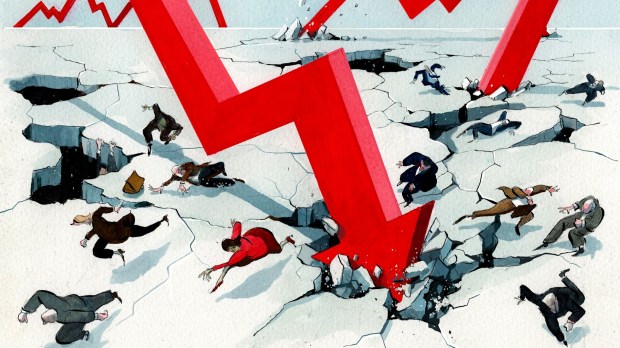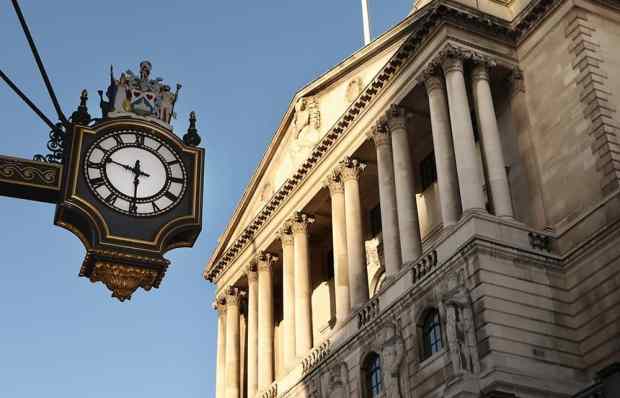Many thanks to the stampede of readers who sent news of bank branch closures. There’s certainly a national pattern, and possibly an epidemic, with HSBC, NatWest, Clydesdale and Yorkshire Bank closing outlets as fast as they can, and only the Nationwide building society making a virtue of offering an undiminished service. Counter staff still in post are praised for their kindness, particularly to readers’ elderly mothers, but sham ‘consultations’ on closures that are faits accomplis are a frequent cause of irritation.
It’s clear that many towns will soon be left with no more than a single ATM plus, if they’re lucky, a post-office counter — making life particularly tough for small businesses. A reader in New York quotes Paul Theroux, in Deep South, on the ‘bank deserts’ that leave rural Mississippi and Arkansas beyond hope of economic revival: is that what will happen here?
Or should we just get over it? I’m grateful to the respondent who reports ‘numerous branches within easy reach though personally, I don’t need them’ and ‘no facile busybody “community” to bother me either’. He suggests I move to where he lives, on the outskirts of Preston. I also admire the 72-year-old widow who tells me I’m ‘quite wrong’ to bang on about closures: she shops with a contactless card, never uses cash or cheques, hasn’t visited a branch for a decade and praises (as do several others) the ‘wholly excellent’ online services of First Direct. ‘Technology has made my life incomparably easier,’ she says. Maybe we should all learn from her example.
Or is there a third way? If banks can co-operate on ATMs — as several of you observed — why can’t they combine branch services so that one multi-bank outlet survives in any significant locality? It occurs to me this could become the new business plan for the tarnished Co-operative Bank, which still has a nationwide network and four million customers of its own but (for lack of capital) was forced by the Bank of England to put itself up for sale this week. Shorn of its recent negative connotations, ‘Co-operative’ could be the perfect name for the multi–purpose high-street money shop most of us still occasionally need.
Yet another Greek crisis
I didn’t have to be Delphic to predict that the Greek crisis wasn’t over when an €86 billion third bailout deal was provisionally agreed in July 2015, with the aim of preventing forced exit from the euro: ‘Impossible to see how it could be “over” without the debt relief [Greece] asked for but the Germans adamantly refused,’ I wrote. Of course that wasn’t how Brussels presented the deal: ‘On this basis, Greece… will irreversibly remain a member of the euro,’ declared Jean-Claude Juncker — without, presumably, having consulted any oracles himself. Further trouble was inevitable, because the trajectory of Greek debt is unsustainable even if the most optimistic projections come true, and because the IMF declined to commit to the 2015 settlement unless its sees further cuts in Greek pensions and willingness on the EU side to discuss sufficient debt relief to make ultimate recovery possible.
As ever, deadlines loom: without a release of bailout money, €8 billion of debt due in July cannot be repaid. With elections coming up in France, Germany and Holland, the EU political establishment is terrified a continuing Greek fiasco will boost right-wing Eurosceptic candidates. And the Trump team — whose chosen man in Brussels, Ted Malloch, sees collapse of the euro as a desirable outcome — now call the shots as the IMF’s biggest funder. Those of us who believed the euro might fracture in the first Greek crisis of 2010 were surprised by the strength of political willpower that held it together; but that’s still the way the tide of history is flowing.
Versace to the rescue
Our issue of 11 April 1992 contained two items that still catch my eye. One was my own first contribution to the magazine; the other, on the inside front cover, an advert for Versace, featuring tanned male models with oiled hair and cream suits — a look so alien to the archetypal elbow-patched Spectator reader of those days that one wonders how on earth the Italian fashion house had been persuaded to buy a page.
The answer is that it was sold by Luis Dominguez, who held the title of publisher here from 1990 to 1996. Trained at the New Yorker and Harper’s & Queen, he favoured luxury-goods advertising as the path to financial survival. An elegant Anglo-Argentinian with a mid-Atlantic accent, Luis (who died on 31 January) was more at home among Bond Street boutiquiers than in our mildly dissolute Doughty Street house, but he was good at his job. Circulation was rising too; Simon Courtauld’s history records that after many years of losses, ‘The Spectator declared (though not too loudly) a profit of £10,000 in 1992’, and many times that figure in the following years. Why not too loudly? Because — so the board concurred with the then editor Dominic Lawson — ‘the contributors must never find out.’
The glossy gentleman
I made my West End stage debut last week in London by Night, a musical tribute to Victorian melodrama at the Savile Club. Several audience members asked afterwards whether I was trying to inject a layer of political satire into my portrayal of a lustful, ill-tempered, money-grabbing, over-the-top braggart with bad hair. In truth I was just playing the stock villain of the genre — and perhaps, with my habitual eye for the sins of the financial sector, channelling J.B. Priestley’s observation in English Journey about moneymen doing to the working classes what the ‘glossy gentleman in the old melodramas always did to the innocent maiden’. But at least my character got shot in the back (by the innocent maiden’s long-lost mother) before he could think of running for President of the United States.
Got something to add? Join the discussion and comment below.
Get 10 issues for just $10
Subscribe to The Spectator Australia today for the next 10 magazine issues, plus full online access, for just $10.
You might disagree with half of it, but you’ll enjoy reading all of it. Try your first month for free, then just $2 a week for the remainder of your first year.















Comments
Don't miss out
Join the conversation with other Spectator Australia readers. Subscribe to leave a comment.
SUBSCRIBEAlready a subscriber? Log in